
Circuit Training 50: The Flashback Episode
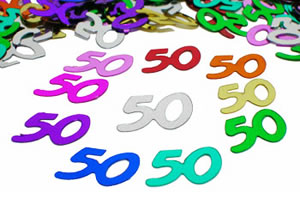
Yes, we've reached an important landmark, the 50th Circuit Training (the regular column where I let comics warble on about their latest project for a bit in the hope that they'll eventually offer up some juicy nuggets about disastrous programme ideas, horrific filming experiences and the broadcasting business generally).
For this special edition, following the finest traditions of TV comedy, it's time for a clip show, trawling through the old stuff and cobbling together a few good bits rather than coming up with anything new or creative. In fact, let's compound that in our opening montage by mocking some misguided, Monkey Tennis-like ideas for new TV shows. Hey, at least they tried...
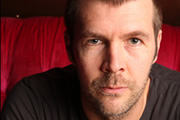
Rhod Gilbert: One of the first things I did was a panel show based in Norwich called Pilau Talk, set in an Indian restaurant. God knows how they got hold of me. It was the usual panel show format, but set in an Indian restaurant - the scores were on poppadoms - and called Pilau Talk because it was on fairly late.
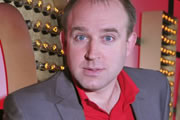
Tim Vine: We'd done Fluke on Channel 4 and I really loved the format: completely inconsequential questions but with a proper prize like a car at the end of it. Then we did a pilot in America. It was the Fluke idea but they decided to mix it up a bit, so they put a monkey in as well and called it Beat the Chimp. One of the contestants would be this monkey, with the possibility every week that he might win it. That, with hindsight, was not perhaps such a great idea.
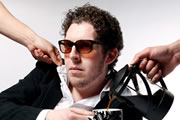
Carl Donnelly: I did a weird show for Comedy Central called Grouchy Young Men, and I wasn't very good on that. They filmed it at nine o'clock in the morning at my house, so literally woke me up, came in and started asking me all these questions. "So do you hate women, how long they take in the bathroom and stuff?" and I was like "Er, not really." It was all these things they were trying to make me say that I didn't agree with, so I ended up just being really miserable.
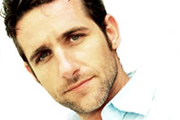
Tom Stade: Tramadol Nights is going to go through the roof [on DVD - Stade co-wrote it] because it's such a one-off. I mean, Channel 4 got sued or something and lost billions of dollars to Jordan and her retarded child... I'm sorry Jordan, I didn't mean to say that. But Harvey just made her a whole bunch more money, which is good for you, Harvey. "Harvey we are all proud of you, making your mum a whole bunch of law money."
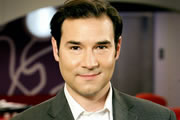
Adam Buxton, on the now infamous sitcom The Persuasonists: When you're involved with something that successful it changes you but I've done my best to keep my feet on the ground. The beginning of the year after the show went out was pretty crazy, just non-stop parties and award ceremonies and gold food and sluts. Angelina Jolie would ring up constantly and ask me to do bits of her favourite Persuasionists episodes down the phone. She'd put me on speaker so Brad and the kids could hear too and I'd do the bit about inventing a slogan for Cockney Cheese and they'd roar with laughter and beg me to go to Hollywood but I decided against it.
Comedians are often solitary beasts, and their liaisons with others can be suitably awkward...

Stephen Grant, on writing for Radio 1: Usually, the bigger the DJ, the less interest they had in coming up with any ideas. I worked mostly with Scott Mills - he still does some of the ideas we worked on now, many years after I left - and he was fun, if a little reserved. Zoe Ball was lovely, though Simon Mayo was tough to get on with and Sara Cox didn't want 'anything funny on her show'.

Kevin Eldon, on working with Lee & Herring: I've never told anyone this but they beat me. They enjoyed it too. Sadists they were. They had an oubliette in their castle they'd throw me down when I hadn't said a word in their scripts right. That's right, an oubliette. I used to call them Cruellee and Scaring. I've had to have a lot of therapy. They have matured like evil cheeses.

Michael Smiley, on (not) working with journalist wife Miranda Sawyer: She wouldn't write with me. A couple of times we've laughed at the idea - 'why don't we do something' - but it's hard enough with one doing the dishes while the other's doing the dinner, we want to kill each other. To actually sit down and try to write a script together, a police siren would go off, helicopter overhead, hostages taken... and the hostage taken would be me, I'd be crying and sitting in the corner, while she had a gun to my head. So, no, we don't need to, she's already talented as a writer, she doesn't need me mucking up her stuff.
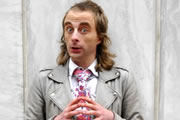
Paul Foot, on being directed by Noel Fielding: You mean that man I met in a Moroccan brothel? He says he directed it, I just thought we were meeting for lunch a few times. He brought home the ashes, usually in an Ottoman pot but occasionally just in a Tupperware box, and we'd sit on the balcony discussing mutual friends who are now dead mostly. Sometimes he'd bring a recorder to play futuristic hymns on, and I would clap and weep in time to the music.
Success is a fickle mistress, and even the well-established names still fret about making a living...

Richard Herring, on not following Newman & Baddiel to Wembley Arena: With Lee & Herring, no-one really came to see us. Even with my early tours, we were a big hit in Edinburgh, 150-seater venue, it got good reviews. When we toured it about 30 people came to see us. With Lee & Herring it was like anyone who liked us was too young to be allowed out at night.
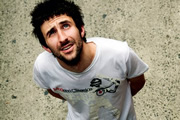
Mark Watson, also on touring: I commenced worrying about ticket sales in about October last year and I'm confident of sustaining the anxiety till the tour ends in early 2011. This is obviously a big commitment to fretting, but it's what I'm good at. I don't think you are ever inured to paranoia about sales figures, because it always seems so unlikely that anyone would pay to see you. Sometimes I look at punters filing in to a big theatre and think - in the nicest, most grateful way - "why have you come?"
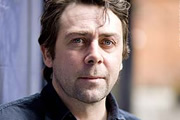
Sean Hughes, on not being as famous as he was: The night before the funeral, they have the empty coffin in the church where the immediate family sit in the front row and it's an opportunity for the neighbours to shake your hand. And all they'd do with my mum and my two brothers and an uncle, they'd say 'sorry for your troubles.' Except then they came up to me and said 'sorry for your troubles - you haven't been on telly much lately have you?'
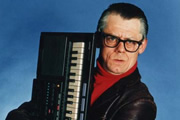
John Shuttleworth, on needing a thick skin in this business: Yes, an extremely resilient personality. I've had to have that, you see, to be able to keep going in the face of utter rejection. Although my wife, Mary, doesn't help by insisting that I play my organ in headphone mode. That can make my breathing become raspy, and excessive saliva is sometimes produced. But even though I'm no spring chicken, remember, neither was Clive Dunn.
For those who do achieve wider recognition, there are side effects...
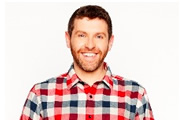
Dave Gorman, on having inspired lots of 'lecture' stand-up: If I'd walked on stage in Are You Dave Gorman? and my first words had been "Right, I went to meet as many Dave Gormans as I could" you'd have recoiled. You'd have leaned back and thought "I don't like this guy. What's up with him?" I think that's what I see some people do when I see them doing it badly. They think 'I'll just go straight to the weirdness,' which I think they're doing because there isn't a real origin for the weirdness. It isn't a real story. It's one they've contrived. That's where I recoil and that's where people think "Oh, one of those shows." I'm sure that's what some people think I do, but people who have seen it know that's not the case.

David 'Tony Hayers' Schneider, on whether fans have ever danced for him: I've had people say "Do you want me to lapdance for you?" but nobody has come up and done the dance. I get a lot of "Smell my cheese," a lot of "Give me a second series, you shit," a lot of "Who.. do.. you.. think.. you.. are?" But I've not had anyone physicalise that moment. Now you've pointed that out, I'm disappointed.

Stade again, on becoming higher-profile: This is the first year I've come off shows and had PR people telling me what material to do and all that sort of stuff. If I was Monet and my agent came behind me and said "you know what, I don't like that colour green, I think you should do something else," I'd be like, "Yeah shut up, whatever, just sell this shit okay?" You're watching agents try to become artists because they think they know.
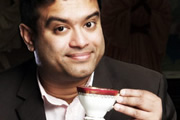
Paul Sinha, on how quiz show fame helped his stand-up: I do think my confidence has gone up several notches since I started on The Chase. In a couple of weeks there's an episode where everything went wrong for me, and I felt much worse after that than I've felt after my worst ever comedy gig. Much worse, the producer's saying "well what happened, what went wrong?" and me not knowing the answer. Whereas my worst ever comedy gig, it's "right, I'm sorry about that, I'll see you guys, bye."
And now, a bit about the comedy broadcasting business, here and abroad...
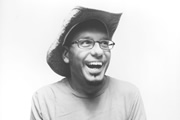
David Cross, on doing his first sitcom in England: I don't want this to sound like I'm speaking ill of the American counterparts but the biggest difference is they're much more hands-off here and deferential to your ideas. And having an American company co-produce it, like the vast majority of American companies, they are hands-on more than I'm comfortable with. Lots and lots and lots and lots of notes, and real minutia. Some of them are good and make the show better but quite a number of them are inane and silly.

Rich Fulcher, on initial reactions to The Mighty Boosh: It's interesting, yeah, mostly you'd get good stuff from your friends, but you could sort of tell when people didn't approach you that they didn't like it. I think we were just trying to make each other laugh, we weren't really thinking about [it being a success]. But it helped because we'd already done several stage variations, then the radio show, and it took that for the executives to think 'oh well, they can do a half hour narrative thing if they can do a radio show.' It almost took that to get their minds around it, because they'd see us on stage and go 'I love it, but [dopey voice] I don't know what to do.'
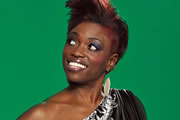
Andi Osho, on the benefits of being a black, female comic: You'd be naive to think that people have gotten to where they are just on their merits as comedians. It happens because they've got something different to offer, which broadcasters or promoters think they can do something with, or will make the bill more interesting. For example, Jack Whitehall is a good-looking upper class - not even middle class - young white guy and that was interesting to broadcasters and that's why he ended up doing Big Mouth and lots of other different shows. And the same with me, there's something about me that they've gone 'Oh well, that's different, we can do this, this, and this with that' and off you go. So I'm not gonna pretend that it hasn't contributed. But I hope that I deliver as well.

Rob Rouse, on whether it was tough being replaced on The Friday Night Project: The honest answer would be yes. It was a strange thing to watch grow in your absence, having been switched or removed or however you choose to look at it. We were all told 'right we're gonna redo it' and, yeah, to watch something like that, you couldn't help but think 'that's a big boat sailing off over the horizon.' That would be me set for life, me doing thousand-seater venues. It's so easy to put bums on seats if you're on the telly regularly, because it's a small country we live in and a small industry.

Humphrey Ker, on the Best Newcomer knock-on effect: It's been lovely this year because I've been able to continue doing the shows. In previous years we had very successful Penny Dreadfuls shows that just died after Edinburgh because we weren't very good at maximising momentum. I've also noticed a bit more industry interest, which basically amounts to being invited to the Chortle Awards.
Not that comedy is just about, um, comedy, of course...
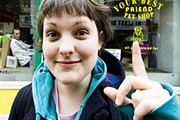
Josie Long, responding to my suggestion that most Brits are apathetic politically: Oh I disagree, especially most young people I know, they're super-politicised. I think I see a lot of normal, regular people, I go to all kinds of towns. The thing I've learned from going on protests and demos is that there are so many people out there of all ages and walks of life and they all feel the same way. I always think that it's helpful to agitate and to be like 'people aren't apathetic, and I can make them not apathetic.' I'm supremely evangelical at the moment, you've caught me on the wrong day!

Steve Hughes, on fast food and foul mouths: There's a great way to get McDonalds out of your country - stop going! You don't have to have a meeting, or do anything illegal, you don't have to leave the house, you don't have to go on a march. Save your money. Some people say 'oh your comedy is offensive.' Oh really? I saw you taking your kids into McDonalds. I find you offensive. Because you don't have the fucking balls to say no to your screaming kid, and you're feeding it fucking cowshit in their fucking deathburger that's made from fucking CIA fucking drugs and you're sitting giving it to your kid saying 'you're rude.' Same with someone ringing up morning TV complaining that someone swore. But you think it's ok to invade Iraq? 'I support the troops but swearing is bad.' Genocide is fine, but saying 'cunt' isn't?

Imran Yusuf, as the London riots were in full swing: It's a shame that when people protest peacefully the authorities come along and beat the crap out of them, and when people go looting, the authorities don't go beat the crap out of them: we need to reverse that. I can't believe this is happening in London. Sometimes I think we need to draft in Kim Jong-Il, just for a weekend, let him deal with it. We'll turn a blind eye and we'll all get back to normal.
And to conclude, a few random reminiscences:

Tiffany Stevenson, at Christmas: The worst present I ever received was from an ex-boyfriend's mum. A minimiser bra. That is basically saying 'Merry Christmas - strap 'em down you tart.'
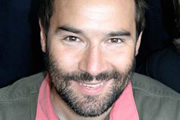
Buxton again, on directing a video for Radiohead: Thom just sits in a corner crying and ranting about climate change. He is undoubtedly the most intense in the band but he's not averse to the occasional bit of clowning. Once, when he knew we were watching, he pretended to put a plastic water bottle in the non-recycling bin! We laughed and laughed then he started crying again so we stopped laughing and things went back to being very tense.

Greg Davies, on late-blooming stardom: People in the comedy world seem far less concerned about aesthetics. That's probably the reason why the band I was in 10 years ago didn't get anywhere. We were hideously ugly. We didn't get anywhere at all. I think it's probably best that it didn't work out. No amount of future generation technology could have disguised our ugliness.

Miles Jupp, on fields: The hardest festival gig I ever did was to follow Mark Thomas at the Leftfield tent at Glastonbury. 800 people just stood up, turned around and fucked off. I looked at them, and then into the wings where thankfully my friend Paul Sneddon was standing. He said "just come off again." So I did.

Foot again, on not playing the game: I've never pitched anything to anyone. People know when a show needs me and the phone will ring. Quite often I'm in the bath though, or smashing specially-purchased greenhouses with a golf club in the garden. The most high-powered meeting I ever attended was powered by paraffin wax. Considerable progress actually, as when I started in this industry they used to be powered by puffins.
Help us publish more great content by becoming a BCG Supporter. You'll be backing our mission to champion, celebrate and promote British comedy in all its forms: past, present and future.
We understand times are tough, but if you believe in the power of laughter we'd be honoured to have you join us. Advertising doesn't cover our costs, so every single donation matters and is put to good use. Thank you.
Love comedy? Find out more